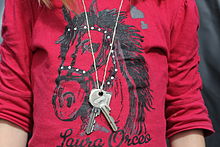Key child
A key child is a child who is regularly left without care after school, for example because his or her parents are employed.
history
The term, which is rarely used today, which was coined in 1956 by the Munich pedagogue and psychologist Otto Speck , had previously existed in the USA since 1944 under the term Latchkey Child . The word, which has a negative connotation, especially in West German usage, alludes to the fact that such children usually had their own apartment key at the time, which often dangled on a string around their necks so that the child would not lose it. The child should then use this key to open the door of their parents' apartment and wait there alone for the parents to come home from work. Since at that time in West Germany the ideal of family roles was still that the father looked after the family and the mother, as a housewife, was responsible for the care and supervision of the children, key children were also associated with difficult circumstances , such as divorced parents or one too little earnings of the father, who made the cooperation of the mother necessary. In general, key children were seen as being deplorable and poorly cared for.
The lack of after-school care and upbringing was and is often viewed as unfavorable for the development of younger school children and is held responsible for problems such as poor school performance and juvenile delinquency . For the development of a child, however, it is not decisive whether a parent is at home immediately after school, but how intensively and regularly one takes care of children and how the bond with important caregivers is. This can be parents, daycare educators, school social workers, neighbors or other relatives. It is not uncommon for key children to be very independent.
In the GDR , the term key child had no negative meaning due to the almost complete supply of after-school care places . On the contrary, for many children it was a status gain to become a key child in the course of the four possible after-school years and to be able to go home alone from the after-school care center right after school or earlier. In addition to the necessity - due to working hours - the parents' trust, which grows with the older child, also played an important role.
Discussion in studies
In the PISA 2000 study , no significant differences were found in the educational success of 15-year-old German schoolchildren between key children and children with at least one parent at home all day . The key child debate also plays a role in the discussion about all-day schools .
In 1996, the German rapper Cora E. had a hit with the song Schlüsselkind , in which she popularized the problem in a differentiating way:
“ I became a key child. These are the children where the parents are not at home
the mother does not stand at the window and wave because she went to work day after day.
It was definitely not easy for her to explain to us that she still likes us.
I haven't missed anything, but you wonder who your father is if you only get mail twice a year.
But today I realize that nothing would be the way it is if it weren't for the way it was! "
literature
- Peter Friedrich: key children. Berlin 1982
- Bernd Ahrbeck: The key child as a hero of the new age. On the volatilization and revitalization of the educational idea , PDF, Humboldt spectrum, 1/2004.
Web links
- Report on the subject of the key child in the show Karambolage
Individual evidence
- ^ Latch-key children , Word of the Day, Randomhouse.
-
↑ J. Baumert et al. (Ed.): Pisa 2000 - A differentiated look at the federal states of the Federal Republic of Germany: Summary of central findings. Max Planck Institute for Human Development, Berlin 2003. Quote: “… family type ['nuclear family' or single parents] and maternal employment are not consistently related to the characteristics of educational success of 15-year-olds. Neither participation in secondary school education nor the acquisition of reading skills seem to be directly influenced by this. ”
Alternative link for this publication: http://www.kmk.org/fileadmin/pdf/PresseUndAktuelles/2003/PISA3.pdf from page 78. - ^ Manfred Günther : Lexicon youth - age. Berlin 2010.
